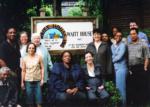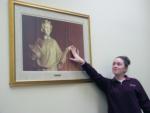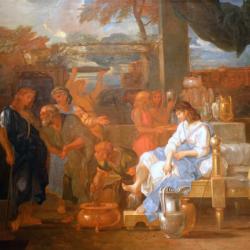Javier Milei, who called pope a 'filthy leftist,' wins presidential elections in Argentina
BUENOS AIRES (OSV News) -- Upstart presidential candidate Javier Milei, who attacked Pope Francis as "filthy leftist," overwhelmingly won Argentina's presidential election on a radical libertarian platform of dollarizing the economy and shrinking the state in a country beset by recurring economic crises and triple-digit inflation.
An economist and congressman, Milei claimed 55% of the vote in the Oct. 19 election and won all but three of Argentina's 24 provinces, besting Economy Minister Sergio Massa of the ruling Peronist coalition.
"Today, the reconstruction of Argentina begins," Milei told enraptured supporters celebrating outside a hotel in central Buenos Aires, who shouted, "Freedom!" and "The caste is going to fall!" -- a reference to Milei calling politicians "the political caste."
"The model of decadence has come to an end," Milei added. "There is no going back."
An eccentric figure with an unruly mop of hair, Wolverine sideburns and a vituperative speaking style, Milei has promised to scrap the Argentine peso for the U.S. dollar to curb inflation of more than 140%, eliminate eight of 18 government ministries, "burn down" the Central Bank and only pursue relations with what he considers free nations.
With 40% of the population living in poverty, his win came as a repudiation of the country's political class and economic policies of the past 20 years. Peronists prided themselves on "social justice," which included free education, health care, and social welfare spending -- much of which became less sustainable in recent years, according to analysts, who pointed to the Central Bank's practice of printing money.
"Massa's campaign of fear fell flat as the dire state of the economy under his watch hobbled any chance he had to win the presidency. 'It's the economy stupid,' still applies," Nicolás Saldías, senior analyst for Latin America and the Caribbean at the Economist Intelligence Unit, told OSV News.
"But the scale of the victory suggests it was more than just the economy," he added.
The Peronist campaign revved up a well-oiled machine: implementing tax holidays and increasing subsidies, delivered Massa a six-point victory in the first round Oct. 22. But voters for the center-right candidate Patricia Bullrich, who finished third and didn't make the runoff, followed her lead and broke for Milei.
"The same party has been governing for (most of) the last 40 years," said Enrique Flores, a Milei supporter who works in recycling. "It's going to be a complete turnaround."
Milei's victory marked a right-ward shift in Latin America, though many analysts considered his win another example of the anti-incumbent wave sweeping the region in recent years.
It also portends challenges for church-state relations. Milei has maligned Pope Francis, a fellow Argentine, as a "malignant presence on earth," while a campaign surrogate spoke of severing relations with the Vatican.
Milei walked back the comments on severing ties with the Vatican and softened his tone in recent weeks to win more centrist voters, according to analysts.
On Nov. 21, the Argentine newspaper La Nacion reported that Milei had "received a surprising phone" that afternoon from Pope Francis, who "contacted him from the Vatican, in a gesture that marks the beginning of their personal relationship." Based on sources from La Libertad Avanza, a political coalition, La Nacion said the president-elect invited the pope to visit Argentina, "both on a state visit, as well as in his capacity as a leader of Catholicism and a clergyman."
"The conversation was 'pleasant,' as described by libertarian sources, and lasted around eight minutes, during which Milei addressed the Supreme Pontiff as 'Your Holiness,'" La Nacion said.
The Argentine Episcopal Conference.formally congratulated Milei in a brief statement released Nov. 21. A day earlier Bishop Oscar Ojea of San Isidro, president of the conference, posted on X : "We value yesterday's democratic day and we pray to the Lord to enlighten the new elected authorities so that they may work for the common good of our people."
Regarding church-state relations under Milei,Mariano De Vedia, a political editor and religious affairs writer at La Nacion, said, "It remains an open question.""The relationship can get on track if the more moderate style that Milei is showing in his recent appearances persists. It's likely, however, that as the social crisis deepens, differences will remain," he said.Priests working with the poor in Argentina have spoken out against Milei and celebrated a September Mass of reparation after his comments denigrating the pope. "He's a person that wants to destroy the state," said Father Roberto Ferrari, a priest working with the poor in the Diocese of San Isidro, which covers suburban Buenos Aires. "He wants to be head of state to destroy the state."Father Ferrari, who is part of the Grupo de Curas en la Opción por los Pobres (Group of Priests in the Option for the Poor), said the church hierarchy "tried not to enter a political dispute" with Milei."Instead of attacking Milei to defend the pope, what they have done is invite him to come (to Argentina) as a positive gesture, instead of making anti-Milei gestures," he added.- - - David Agren writes for OSV News from Mexico City. He is currently reporting from Buenos Aires.


















